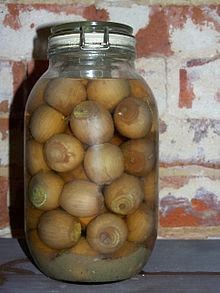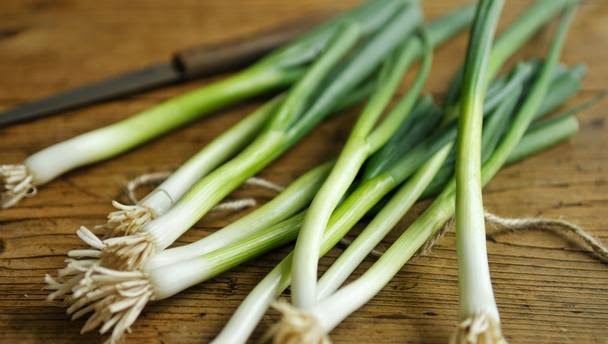
The onion (Allium cepa) (Latin 'cepa' = onion), also known as the bulb onion or common onion, is used as a vegetable and is the most widely cultivated species of the genus Allium. This genus also contains several other species variously referred to as onions and cultivated for food
The onion plant has a fan of hollow, bluish-green leaves and the bulb at the base of the plant begins to swell when a certain day-length is reached. In the autumn the foliage dies down and the outer layers of the bulb become dry and brittle. The crop is harvested and dried and the onions are ready for use or storage.
Onions contain phytochemical compounds such as phenolics and flavonoids that basic research shows to have potential anti-inflammatory, anti-cholesterol, anticancer and antioxidant properties
There are two main classifications of this underground bulb: green onions (also called scallions) and dry onions, which are mature versions of the former. Onions come in a wide range of colors, shapes and flavors.
Common onions are normally available in three colour varieties.
- Yellow or brown onions are full-flavoured and are the onions of choice for everyday use. Yellow onions turn a rich, dark brown when caramelized and give French onion soup its sweet flavour.
- The red onion (called purple in some European countries) is a good choice for fresh use when its colour livens up the dish. It is also used in grilling and char-broiling
- White onions are the traditional onions that are used in classic Mexican cuisine. They have a golden colour when cooked and a particularly sweet flavour when sautéed.
Onions may be bred and grown to mature at smaller sizes. Depending on the mature size and the purpose for which the onion is used, these may be referred to as pearl, boiler, or pickler onions.Pearl and boiler onions may be cooked as a vegetable rather than as an ingredient and pickler onions are often preserved in vinegar as a long-lasting relis.
They contain vitamin C, vitamin B6, folic acid and numerous other nutrients in small amounts. They are low in fats and in sodium, and with an energy value of 166kJ (40 kcal) per 100 g (3.5 oz) serving, they can contribute their flavour to savoury dishes without raising caloric content appreciably
Spring onions should have dark-green leaves and fresh-looking roots.Spring onions are with long green leaves at one end and a white bulb at the other. Choose firm bulbs with even-coloured skins and no signs of sprouting.One of the great things about green onions is that they are often available year round. With a taste and texture that is different from a mature onion,
Pick a normal onion early in the growing season and you'll get a spring onion. Spring onions are useful for adding a marked onion note to dishes, particularly when used raw.
They contain vitamin C, vitamin B6, folic acid and numerous other nutrients in small amounts. They are low in fats and in sodium, and with an energy value of 166kJ (40 kcal) per 100 g (3.5 oz) serving, they can contribute their flavour to savoury dishes without raising caloric content appreciably
Spring onions should have dark-green leaves and fresh-looking roots.Spring onions are with long green leaves at one end and a white bulb at the other. Choose firm bulbs with even-coloured skins and no signs of sprouting.One of the great things about green onions is that they are often available year round. With a taste and texture that is different from a mature onion,
Pick a normal onion early in the growing season and you'll get a spring onion. Spring onions are useful for adding a marked onion note to dishes, particularly when used raw.
Serve spring onions in salads, or sprinkled over Chinese dishes (particularly steamed fish), or stirred into raita or traditional Irish champ (mashed potatoes speckled with chopped spring onions). They can also be brushed with olive oil and chargrilled whole.
The health benefits of onions.
1..They
contain vitamin C, vitamin B6, folic acid and numerous other nutrients
in small amounts. They are low in fats and in sodium, and with an energy
value of 166kJ (40 kcal) per 100 g (3.5 oz) serving, they can
contribute their flavour to savoury dishes without raising caloric
content appreciably
2..Studies have shown that onions reduces the risk of several cancers, even when consumed in small amounts. Can reduce the risk of colon cancer, and ovarian.Onions are also a source of the strong antioxidant vitamin C that helps to combat the formation of free radicals known to cause cancer.
3..The bad cholesterol that causes heart problems can be burnt or removed if onions are consumed daily. It keeps you stay safe from the coronary diseases and also protects the good cholesterol.Onions beneficial effect on the cardiovascular system, regulates the amount of cholesterol and triglycerides, but also affects the immune-boosting effects.
4..Onions increases insulin in the body and also treats diabetes by controlling the sugar levels in the blood
5..The phytochemicals in onions improve the working of Vitamin C in the body, thus gifting you with improved immunity
6..Consuming onions , improve mood and maintain the health of skin and hair.Take one-fourth cup of raw onion juice and add honey to it. Use this to massage your scalp on a daily basis to see the difference.
7..Onions possess enormous anti-ageing benefits. The antioxidant vitamins A, C and E fight against the damage caused by harmful UV rays as well as prevent free radical damage which is responsible for causing premature ageing of our skin. Vitamins and sulphur, on the other hand, protect skin, and keep it soft and supple.Massaging your skin with fresh onion juice helps increase blood circulation and improves the overall
8..The anti-microbial, anti-bacterial and anti-inflammatory qualities of onion can work wonders on your skin. It is a powerful antiseptic which protects your skin from acne-causing bacteria and other skin infections. Onions can be used in the treatment of acne and pimples.
mix 1 tablespoon of onion juice or extract with 1 tablespoon of olive oil and apply it on your face. Leave it for 20 minutes and then wash off.
9..Other benefits of onion: improves balance blood sugar, prevents bacterial infections, contains vitamins C, A and E, which are very good antioxidants
Use onion juice on the hair or the scalp to get rid of lice and hair fall. This is one of the most prominent of onion benefits for hair.
The smell of onions can be a problem, both on the hands and on the breath. After chopping onions, try rinsing the hands with cold water, rubbing them with salt, rinsing again and then washing with soap and warm water. To remove the smell from breath, eat a few sprigs of parsley or an apple to help conceal the odour.Onions contain chromium, which assists in regulating blood sugar.
Onions were historically as a preventative medicine during epidemics of cholera and the plague. They were apparently eaten by Roman emperor Nero as a cure for colds, and its reputation has made onions a popular component in the diets of many countries.
The smell of onions can be a problem, both on the hands and on the breath. After chopping onions, try rinsing the hands with cold water, rubbing them with salt, rinsing again and then washing with soap and warm water. To remove the smell from breath, eat a few sprigs of parsley or an apple to help conceal the odour.Onions contain chromium, which assists in regulating blood sugar.
Onions were historically as a preventative medicine during epidemics of cholera and the plague. They were apparently eaten by Roman emperor Nero as a cure for colds, and its reputation has made onions a popular component in the diets of many countries.


No comments:
Post a Comment